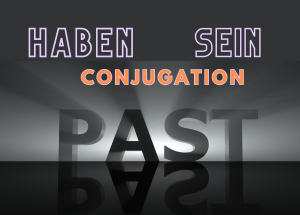Currently Empty: ₱0.00
German Grammar
Learn German Language – Simple Past Tense (Präteritum) for “sein” and “haben”

German’s simple past tense is known as “Prateritum.” This tensive is used to talk about past events or actions that have already taken place.
So, if you are having a hard time understanding these topics, Don’t worry, I got you!
Because, in this article, we’ll examine how to use the simple past tense for “sein” (to be) and “haben” (to have) in a German sentence.

The simple past tense of “sein” (to be) is as follows:
| Personal Pronoun | Conjugation | English |
|---|---|---|
| ich (I) | war | was |
| du (you, informal) | warst | were |
| er/sie/es (he/she/it) | war | was |
| wir (we) | waren | were |
| ihr (you all, informal) | wart | were |
| sie/Sie (they/you, formal) | waren | were |
Here are some sentences using “sein” in the past simple tense:
- Ich war gestern in Berlin. (I was in Berlin yesterday.)
- Du warst nicht zu Hause. (You weren’t at home.)
- Er war sehr müde. (He was very tired.)
- Wir waren im Kino. (We were at the cinema.)
- Ihr wart spät dran. (You all were late.)
- Sie waren sehr nett. (They were very nice.)
The simple past tense of “haben” (to have) is as follows:
| Personal Pronoun | Conjugation | English |
|---|---|---|
| ich (I) | hatte | had |
| du (you, informal) | hattest | had |
| er/sie/es (he/she/it) | hatte | had |
| wir (we) | hatten | had |
| ihr (you all, informal) | hattet | had |
| sie/Sie (they/you, formal) | hatten | had |
The past tense of “haben” (to have) can be expressed as follows:
Below are examples of sentences using “haben” in the simple past tense:
- Ich hatte gestern frei. (I had yesterday off.)
- Du hattest viel zu tun. (You had a lot to do.)
- Er hatte keine Zeit. (He didn’t have time.)
- Wir hatten viel Spaß. (We had a lot of fun.)
- Ihr hattet Glück. (You all were lucky.)
- Sie hatten kein Geld. (They didn’t have any money.)
Note that, when speaking German in everyday conversation, perfect tenses (known in German as the “Perfekt”) often replace simple past tense (such as “haben”, “sein”) with the so-called past participle form of main verbs (“Prateritum”).
However, in written German, the simple past tense remains commonplace.
Conclusion
The simple past tense (Prateritum) is used to talk about past events, record time, or describe completed actions.
For verbs “sein” and “haben,” conjugations in the simple past tense is different than in the present tense.
By learning the German simple past tense, you can effectively communicate about past events and actions.

